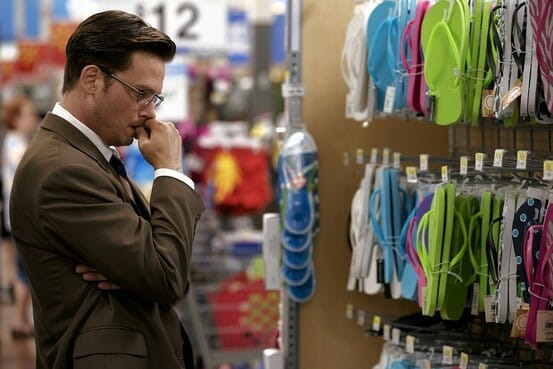
Anthony Burgess, the author of A Clockwork Orange, once said that the colors of the real world only seem really real when you watch them on the screen. Through the eyes of Daniel, the readjusting, just-released, one-time convicted killer, we see a Walmart in all its stark reality as he walks through its tidy aisles filled with bursting colors from TVs, video games, flip-flops, beanbag chairs and yards of yarn. His new glasses make the world even more real as he declares the experience a change from “looking at shadows on a cave wall” referring to his incarceration while quoting Plato’s Cave. It’s one of the show’s many metaphors and implanted references to literature as we see how Daniel’s voracious appetite for books has formed the person he has become, someone very different from the boy who left home 19 years earlier. When he leaves the store with his mother they are assailed by a news crew in the parking lot. While Mom is shaken by their attention, Daniel is relatively calm and easily dispatches the crew through his peaceful silence.
Daniel’s attorney Jon Stern meets with the new, cheerful-but-ball-busting prosecutor who is not as assured of Daniel’s complete innocence as Jon is. She has the air of being a formidable foe, one that could make things difficult for Jon and for Daniel. The sheriff continues his re-investigation and questions Trey (Sean Bridgers) who admits that he had slept with Hannah, just as many others had, but not on the night of the murder. When asked if he had seen George (Trey’s high school friend who had shot himself a few days earlier after a secret meeting with Trey) Trey lies and says he has not seen George “in a good while.”
Out of town for a conference, a drunken Ted Jr. calls Tawney as she prepares for bed. In spite of his loving flirtations, she cuts the conversation short and hangs up. It is quite the contrast to how she interacts with Daniel when he accepts her invitation to help at her church. She is extremely talkative, telling him how God fills her life with “indescribable joy.” She expresses how much she cares for Daniel to the point of persuading him to consider baptism. As she hugs him in a joyful moment he finds it hard to let go, to the point of indelicacy. As an explanation he tells her how not being touched “in any positive way for so long” does something to a man. “You begin to vacillate between being repelled by touch and seeking it out in any form, even the most negative.” But her touch, he says, suits him, even though he knows it’s improper. She does little to condemn his actions or his words.
As he walks home through the darkened, recession-damaged downtown, he runs into an old friend he knew from school who offers to cut his hair at the beauty shop she owns. While sitting in her barber chair she tells him of a promise she made to herself that if he ever got out of prison she would offer her body to him. Whether it’s a lustful fantasy of seduction or just a charitable gesture, for Daniel it’s what the doctor ordered after 19 years of forced celibacy and the simmering afternoon tension around Tawney. He accepts her offer.
The “unknowing” of whether or not Daniel killed his high school girlfriend is the rose-colored perception that affects our opinions on his behavior. Are his spells of silence and his awkward interactions with others simply the results of being holed up in a cell for two decades, or are they the actions of a disturbed killer?